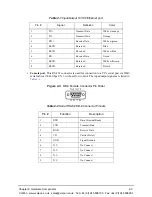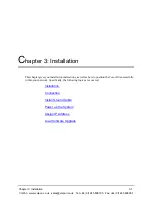
Chapter 1: Overview
1-11
Admissions Control.
All H.323 endpoints must register and request permission to enter the gate-
keeper’s zone; the gatekeeper will confirm or deny access to the network.
The gatekeeper authorizes
network access and protects the integrity of the network using Admissions Request (ARQ), Admis-
sions Confirmation (ACF) and Admissions Reject (ARJ) messages.
SIP User Agent
SIP (Session Initiation Protocol) is a signaling protocol used to establish a session on an IP network
for voice control and management; it is a request-response protocol that closely resembles Hypertext
Transfer Protocol (HTTP), which forms the basis of the World Wide Web. SIP re-uses many of the
constructs and concepts of Internet protocols such as HTTP and Simple Mail Transfer Protocol
(SMTP). The purpose of SIP is only to establish/change/terminate sessions. SIP is not concerned
with the content or details of the session.
SIP is Transport layer-independent, which means it can be used with any transport protocol: UDP,
TCP, ATM, etc. It is text-based, so it requires no encoding/decoding like H.323. And SIP supports
user mobility, using proxies and redirecting requests to your current location.
There are three basic components of SIP:
1. User Agent (Endpoint)
•
client element, initiates calls
•
server element, answers calls
2. Network Server (Proxy Server or Redirect Server)
•
name resolution
•
user location
•
redirect and forking
3. Registrar
•
Stores registration information in a location service using a non-SIP protocol.
VoIPon www.voipon.co.uk [email protected] Tel: +44 (0)1245 808195 Fax: +44 (0)1245 808299
















































